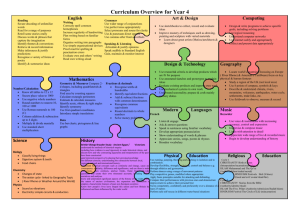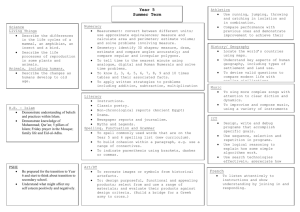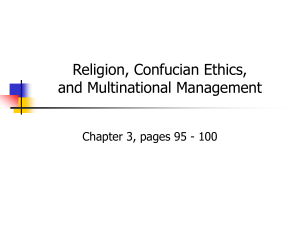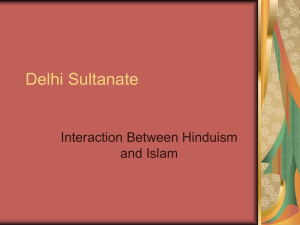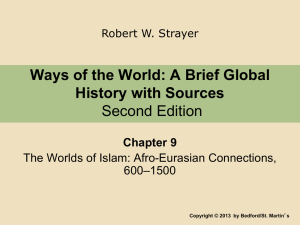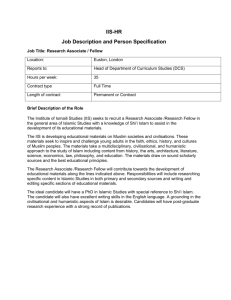The Master of Arts in Islam combines the study of classical Islam with
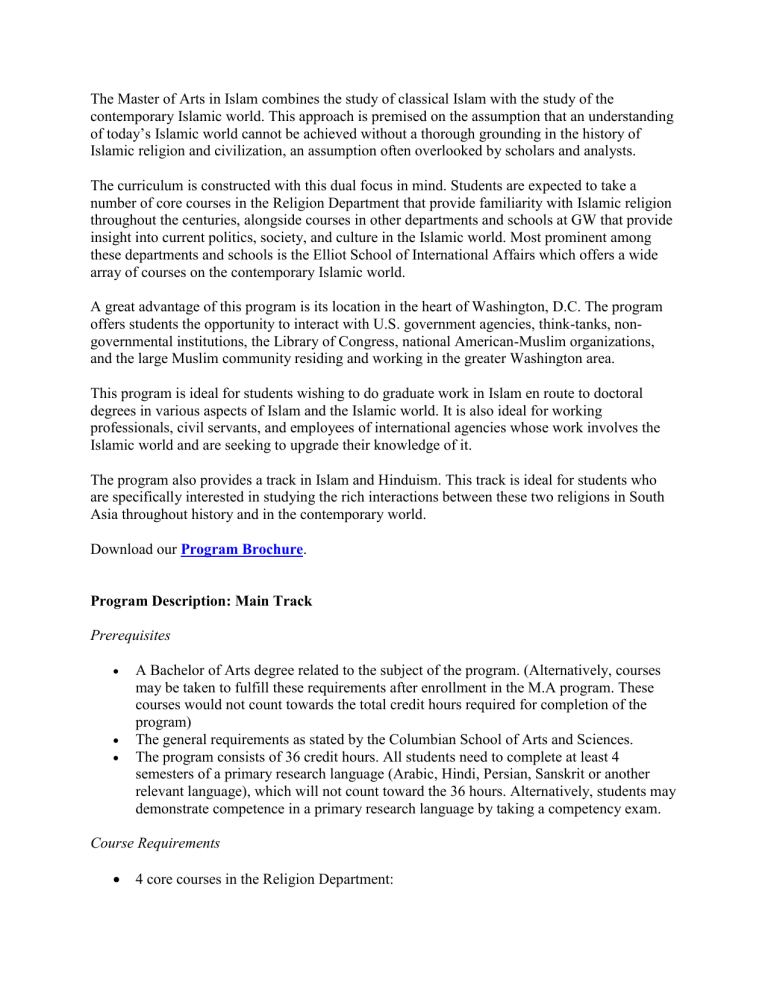
The Master of Arts in Islam combines the study of classical Islam with the study of the contemporary Islamic world. This approach is premised on the assumption that an understanding of today’s Islamic world cannot be achieved without a thorough grounding in the history of
Islamic religion and civilization, an assumption often overlooked by scholars and analysts.
The curriculum is constructed with this dual focus in mind. Students are expected to take a number of core courses in the Religion Department that provide familiarity with Islamic religion throughout the centuries, alongside courses in other departments and schools at GW that provide insight into current politics, society, and culture in the Islamic world. Most prominent among these departments and schools is the Elliot School of International Affairs which offers a wide array of courses on the contemporary Islamic world.
A great advantage of this program is its location in the heart of Washington, D.C. The program offers students the opportunity to interact with U.S. government agencies, think-tanks, nongovernmental institutions, the Library of Congress, national American-Muslim organizations, and the large Muslim community residing and working in the greater Washington area.
This program is ideal for students wishing to do graduate work in Islam en route to doctoral degrees in various aspects of Islam and the Islamic world. It is also ideal for working professionals, civil servants, and employees of international agencies whose work involves the
Islamic world and are seeking to upgrade their knowledge of it.
The program also provides a track in Islam and Hinduism. This track is ideal for students who are specifically interested in studying the rich interactions between these two religions in South
Asia throughout history and in the contemporary world.
Download our Program Brochure .
Program Description: Main Track
Prerequisites
A Bachelor of Arts degree related to the subject of the program. (Alternatively, courses may be taken to fulfill these requirements after enrollment in the M.A program. These courses would not count towards the total credit hours required for completion of the program)
The general requirements as stated by the Columbian School of Arts and Sciences.
The program consists of 36 credit hours. All students need to complete at least 4 semesters of a primary research language (Arabic, Hindi, Persian, Sanskrit or another relevant language), which will not count toward the 36 hours. Alternatively, students may demonstrate competence in a primary research language by taking a competency exam.
Course Requirements
4 core courses in the Religion Department:
Rel 5770: Islamic Civilization and the West (Nasr)
New Course: Islamic Historiography (Pemberton)
New Course: Qur’an and Hadith (Faghfoory)
New Course: Islamic Law (Moussavi)
6 additional courses chosen from a pre-approved list in a variety of disciplines, most of which should focus on Islam in the contemporary world.
2 courses in sequence dedicated to the composition of a thesis.
Core faculty
Dr. Mohammad Faghfoory , Islam
Dr. Seyyed Hossein Nasr , Islam
Dr. Kelly Pemberton , Gender and Islam
Participating Faculty
Dr. Muriel Atkin , History
Dr. Nathan Brown , Political Science
Dr. Robert Eisen , Judaism, Peace Studies
Dr. Dina Khoury , History
Dr. Marc Lynch , Political Science
Dr Ahmad Moussavi, Islamic Law and Jurisprudence
Track in Islam and Hinduism
Prerequisites
The prerequisites for this track are the same as those for track focusing only on Islam.
Course Requirements
2 core courses in the Religion Department:
Rel 3901: Theory and Method in the Study of Religion (Staff)
Rel 3915: Islam and Hinduism in South Asia (Pemberton)
8 courses in Hinduism or Islam, including a sequence of five courses in the history, literature, and culture of Hinduism or Islam, one course on theory and method in the study of religion, and the course “Islam and Hinduism in South Asia” taken for graduate credit. For these requirements, s tudents can take courses offered by a consortium of participating universities in the area. However, a majority of the courses among must be taken at GW.
2 courses in sequence dedicated to the composition of a thesis.
Participating Faculty
Dr. Alf Hiltebeitel , Hinduism, The George Washington University
Dr. Seyyed Hossein Nasr , Islam, The George Washington University
Dr. Kelly Pemberton , Hinduism and Islam, The George Washington University
Dr. Mohammad Faghfoory , Islam, The George Washington University
Dr. Shubha Pathak , Hinduism, American University
Dr. Abdul Aziz Said , Islam, American University
Dr. Sidney Griffith , Islam, Catholic University
Dr. John Esposito , Islam, Georgetown University
Dr. Ariel Glucklich , Hinduism, Georgetown University
Scholarship Opportunities
Limited merit-based scholarships to help cover tuition costs are available.
Internship Opportunities
Institute for Women's Policy Research
KARAMAH: Muslim Women Lawyers for Human Rights
Guidelines and forms for completing the MA
Guidelines for Thesis Prospectus
Thesis Prospectus Form
Application for Graduation
Consortium school schedules of classes
American University
Catholic University
Georgetown University
Requesting Information
For information about GW, courses, our department, and the application package, please visit the graduate student information website , where you will also find online application. You may also request to receive this information by mail. To do so, please submit a request to the Graduate
Admissions Department via the same site.



